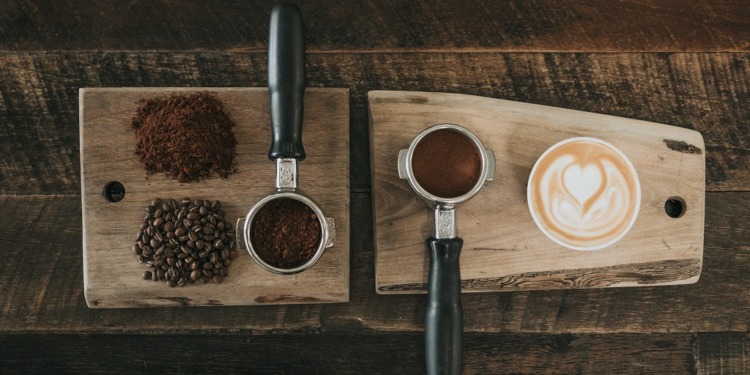2.25 billion cups of coffee are consumed every day, creating 560,000 tonnes of waste in the form of spent coffee grounds. The majority of this waste ends up in landfills and contributes to global warming if not processed correctly as CO2 and methane are released into the atmosphere. An estimated 340 cubic meters of methane is emitted per tonne of discarded coffee waste, a significant amount when you consider that methane is 86 times more harmful to the environment than CO2.
Victor Krishyanson and his colleagues at Latvian-based startup Koffeco are attempting to change this by transforming coffee waste into sustainable, eco-friendly products by applying a know-how recycling approach. Coffee grounds are rich in oil which, when extracted, are of use across the biopolymer industry. Coffee essential oil is also included in a range of popular cosmetics as it is high in antioxidants and is proven to increase collagen and elastin. This makes the skin feel firmer and has a similar effect to hyaluronic acid which is included in the majority of anti-aging skin care products.
This waste can also be converted into briquettes and logs due to its combustibility. Coffee-based alternatives to firewood, sawdust, and peat comply with the European zero-emissions strategic plan targets for 2030 and 2050. When wood is burnt, it emits the CO2 that it has stored for over 100 years. As the lifecycle of coffee plants is only one year before they are harvested, they emit far less greenhouse gas. Popularising wood substitutes that use coffee waste would also reduce the need for deforestation.

As well as being better for the environment, coffee briquettes are a more efficient fuel than wood and charcoal. They release up to 25% more heat and burn for 20% longer, making Koffeco’s products a logical everyday alternative if their infrastructure for collecting and transforming coffee waste can be implemented on a large scale.
Another range of products that Koffeco is working on is disposable tableware. An eco-friendly alternative to commonly used plastic cutlery and plates, the startup is breaking new ground by putting coffee waste into the circular economy through a range of consumer products. Coffee-based disposable drinks cups are also being worked on and Krishyanson has said that Koffeco will continue to develop new technologies and sustainable products with coffee waste.
Sustainable Consumption and Production Are Key for Sustainable Development | 5 Opportunities of a Circular Economy | How Can Cities Create Circular Jobs? || Climate Change is Affecting Your Favorite Cup of Coffee — and so Much More |
The youthful team of four behind Koffeco consists of ambitious entrepreneurs and engineers who are aiming to crack the European market in the near future. Their sustainable partnership with service station chain Circle K has already resulted in the recycling of over two tonnes of coffee grounds and allowed for the first prototype coffee briquettes to be developed. The company is now also partnered with Kalve Coffee Roasters and Riga Technical University amongst other respected Latvian organizations and is part of the Estonia-based Beamline Accelerator.
Koffeco is currently funded by grants from the Investment and Development Agency of Latvia (LIAA). Having received €70,000 from LIAA so far, the company is aiming to scale up and raise €450,000 in pre-seed financing before expanding to collect coffee waste from across Latvia initially before expanding across Europe.
Coffee is an essential aspect of day-to-day life for many people, however very few know of the detrimental environmental impact that spent coffee grounds have on the environment when they are not disposed of properly. While Koffeco still has a long way to go before its visions of collecting and procuring coffee waste across Europe are achieved, the initial signs are promising. The startup has already proved that it is possible to recycle spent coffee grounds into a range of recyclable products. The next step is to continue to attract more investors so that Koffeco can expand out of Latvia and allow people across Europe to enjoy their coffee without unwittingly damaging the environment.
Editor’s Note: The opinions expressed here by Impakter.com columnists are their own, not those of Impakter.com – In the Featured Photo: Coffee is one of the most popular drinks in the world. Featured Photo Credits: Unsplash.










